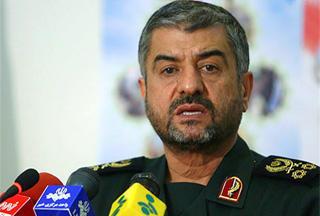
IRGC Commander sets conditions for U.S.
Commander of the Islamic Revolution Guards Corps, Major General Mohammad Ali Jafari has said that the U.S. should remove its bases within a radius of thousands of kilometers from Iran's borders if Washington intends to continue the policy of sanctions against the defense complex of Tehran.
Jafari added that the country's missile power in the air, sea and land "is growing rapidly" and cannot be "the subject of deals or negotiations",RIA Novosti reported citing Tasnim news agency.
Earlier, the United States brought 18 organizations and individuals to the list of sanctions on Iran's missile program which included two Iranian organizations that the U.S. believes are involved in the ballistic missile program, seven organizations and five private individuals supporting the Islamic Revolution Guards Corps (IRGC), as well as a criminal organization, two Iranian businessmen and a company that organized the theft of American and Western computer programs.
At the same time, the U.S. confirmed that Iran is in compliance with the terms of the Joint Comprehensive Plan of Action (JCPOA) for the nuclear program.
Tehran condemned Washington's sanctions, saying that it would impose retaliatory sanctions against American individuals and companies.
Iranian Foreign Ministry said in a statement that despite fulfilling obligations under nuclear deal, the U.S. administration added a number of other Iranian and non-Iranian natural and legal persons to the list of its unilateral and illegal sanctions under the pretext of supporting Iran's missile program.
The statement stressed that the Trump administration made the move to compensate for its failure to persuade its European allies into withdrawing from the nuclear deal.
The Iran nuclear deal was negotiated inJuly 2015 betweenIran, the five permanent members ofthe United Nations Security Council and Germany. By ratifying the plan, Iran agreed toscale downits nuclear activities inexchange forsanctions relief.
The agreement envisions that in return for verifiable abiding by its commitments, Iran receives relief from U.S., European Union, and UN Security Council nuclear-related economic sanctions.
At the same time, the U.S. retains sanctions against Iran on the missile program, human rights and on suspicion that Tehran sponsors terrorism.
Currently, presidential administration is reviewing policy on Iran, not only looking at Tehran's compliance with the nuclear deal but also its behavior in the region.
---
Kamila Aliyeva is AzerNews' staff journalist, follow her on Twitter:
Follow us on Twitter
Legal Disclaimer:
MENAFN provides the
information “as is” without warranty of any kind. We do not accept
any responsibility or liability for the accuracy, content, images,
videos, licenses, completeness, legality, or reliability of the information
contained in this article. If you have any complaints or copyright
issues related to this article, kindly contact the provider above.


















Comments
No comment